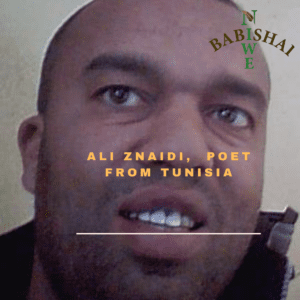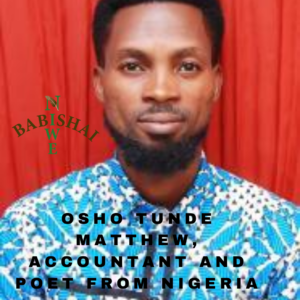Ali Znaidi; a most passionate poet, who exchanged science for art.
Having developed and cultivated a passion for literature, writing, and arts from a young age, I sacrificed medical and scientific studies to get involved in literary studies. I studied English at the university and obtained a Bachelor’s Degree in Anglo-American Studies in 2002. There is nothing here, in Tunisia, concerning creative writing in the English language. Tunisian publishing houses and magazines publish creative writings either in Arabic or in French. By the way, although it is humble, my experience is unique as I am among a couple of names (which are counted on the fingers) who originally write poetry in English in Tunisia. (Writers here write either in Arabic or in French). Besides, I am the only Tunisian, writing in English language and residing in Tunisia, who is widely published in international literary magazines. Thanks to the Internet and small presses, I have the opportunity to be published in more than 350 international magazines since I have been submitting, which is in itself a great accomplishment, especially in my case as a nonnative speaker of English. For instance, my poem “Curvaceous Black Sappho in White Shoes” was published in the Aké Review in 2019 alongside the work of Nobel Prize Laureate for Literature Prof. Wole Soyinka. This is extremely humbling and exciting all at the same time.
Talking about my poems and my use of the English language, Annie Avery editor of Heard Magzine said,
“Tunisian poet Ali Znaidi’s poems rise up like flowers from the challenges he has faced as a writer. Now in full bloom, his work has been published numerous times with a new chapbook forthcoming. His craft is skillful and inventive and I sense a philosopher peeking out from behind his words. He writes in English as if it was his mother tongue, but the mystical voice of his ancestral gift cannot be hidden.”
I always consider poetry as a kind of a panacea. So I write to heal my wounds. Every word in a poem or haiku functions as an aspirin or a pill. I strongly believe in the healing power of the poetic word. Without poetry, I would lose my self-control. Poetry is my presence in this world. The sheer joy of being published has always its own charm. Reaching the reader makes the day of the poet. That’s why procrastination makes me very anxious and perplexed. Without writing, I feel invisible. I also love writing because it changes raw and ordinary language into something sublime. I always strive to do so.
Why were you inclined to submit for the #Babishai2020 haiku award?
I submitted 3 haiku poems for the #Babishai2017 haiku award. As I didn’t make it to the longlist, I wanted to give myself another chance by submitting for the #Babishai2020 haiku award . I also love entering writing competitions especially those of high caliber like yours hoping to reach global readership. Well, here I am on the longlist alongside talented writers. Whether we like it or not winning a prize gives the writer exposure and recognition.
What was your process in writing this particular haiku below?
total blackout…
street lamps glow with
mating fireflies
I have always pondered on dichotomies because of the contradictory human nature and the paradoxes available in the environment. I live in Redeyef; a mining town in the south west of Tunisia where from time to time all lights are turned out or extinguished due to a storm, intense heat, or maintenance. So I always wonder what if there is total blackout. Hence the only solace I could imagine is some mating fireflies bestowing their light upon the dimmed or extinguished street lamps. I wanted to create a seemingly picture of hope—mating fireflies and the promise of light multiplication. I tried to capture that light at the end of the tunnel in a country suffering from agents of darkness.
In your opinion, what is the future of African haiku?
Answering this question about the future of African haiku brings to mind one and only one word, that is promising. With a burgeoning community of such African haiku poets as Adjei Agyei-Baah, Emmanuel Jessie Kalusian, Kariuki wa Nyamu, Anthony Itopa Obaro, Kuadegbeku Pamela, Celestine Nudanu, Blessmond Alebna Ayinbire, Kwaku Feni Adow, and, humbly, myself, just to name a few, the future could only be bright..
How are we able to share about this haiku experience, with Tunisia,
and the world?
Writing haiku is really an enriching experience. But being a poet who writes in another language rather than Arabic or French in Tunisia is very depressing because of lack of support and audience. The funny side is that, for now, I am more known in the world than in my homeland. Anyway, despite health issues, lack of support, and other hurdles, I’m striving to achieve success.
Thank you very much for giving me this opportunity to express myself and for your unflinching zeal in the promotion of haiku in Africa. I am very grateful to the Babishai Poetry Foundation, you (Beverley Nambozo Nsengiyunva), and the Babishai team for giving African poets and haikuists this opportunity to showcase their work. I also want to congratulate all the longlisted poets and wish them good luck.

